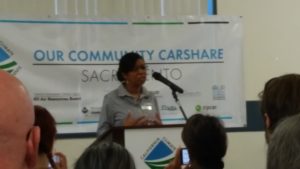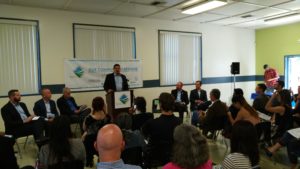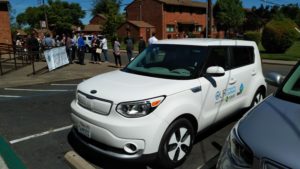Affordable housing residents in Sacramento can now drive zero-emission electric vehicles (EVs) for free, thanks to a grant from the state’s Car Sharing & Mobility Options program. The Our Community CarShare Sacramento project was launched today at Alder Grove Apartments, one of three affordable housing communities in the Capitol City to pilot this first-of-a-kind approach to increasing low-income drivers’ access to new, clean vehicles. La Shelle Dozier, Sacramento Housing and Redevelopment Agency (SHRA) Executive Director, expressed optimism that this novel project will provide residents with reliable transportation, a major challenge residents must overcome so they can get to work or to job interviews on time and become more economically-mobile.
City and county leaders speaking at today’s event shared Dozier’s enthusiasm, including Sacramento County Supervisor Phil Serna who lived for the first two years of his life at Alder Grove, which is in the district he represents. Supervisor Serna also represents the Sacramento region on the California Air Resources Board (ARB), and he shared with the nearly 100 attendees that days like this – when programs to meaningfully improve people’s health and well-being commence – are why he sought a seat on the state air board.
ARB administers the Car Sharing & Mobility Options grant program, as well as several other low carbon transportation investments that are accelerating Californians’ use of clean vehicles in order to improve air quality and protect public health and the climate. Funding for these clean vehicle programs comes from California Climate Investments, a fund created to reduce greenhouse gas emissions using fees from major polluting industries in the state. Some clean transportation investments are designed to incentivize drivers to choose a plug-in or fuel cell electric vehicle by lowering the purchase price of EVs via rebates and financing assistance. Alternatively, EV car-sharing projects enable thousands of people to use and benefit from clean vehicles without the obligations of car-ownership and maintenance. In Sacramento, for instance, the goal is to serve approximately 2,000 residents at three affordable housing communities with eight all-electric, zero-emission Kia Souls that can go over 90 miles on a single charge.
In addition to serving low-income Californians specifically, the siting of clean vehicles and electric charging stations in particular neighborhoods is another remarkable feature of EV car-sharing and other clean transportation programs that ARB administers. Just southeast of the I-5/I-80 interchange, Alder Grove Apartments is located within the top five percent of disadvantaged communities in California where environmental hazards and social vulnerabilities to pollution are excessively high compared to other parts of the state. Consequently, the positive impact of zero-emission vehicles is much greater when driven through neighborhoods dealing with heavy traffic and severe air pollution. “This [Our Community CarShare Sacramento] is what environmental justice looks like,” declared Sacramento Mayor Darrell Steinberg to the crowd that gathered in support of the project’s launch.
Every shared vehicle helps to displace about thirteen cars on the road and supports public transit, according to Zipcar, a national leader in car-sharing that will operate the project in Sacramento. ARB recently issued a $6 million grant solicitation for the next round of car-sharing pilot projects to continue piloting this model of EV adoption in more disadvantaged communities in California. And in Sacramento, partners involved in setting up Our Community CarShare such as the local air district, are already thinking about expansion – more vehicles at current locations and/or adding new locations. As one Alder Grove resident and mother explained to me, she’s excited to test drive one of the Kia Souls even though she has her own car because of the clean air benefits. “Taking care of the environment and doing the right thing – that’s what it’s all about!” Fortunately, car-sharing offers a solution to not just clean air and clean transportation needs, but it can also improve a person’s economic mobility too.
[row]
[col span = “1/2”]

[/col]
[col span =”1/2″]

[/col]
[/row]
[share title=”Share This Post”]








